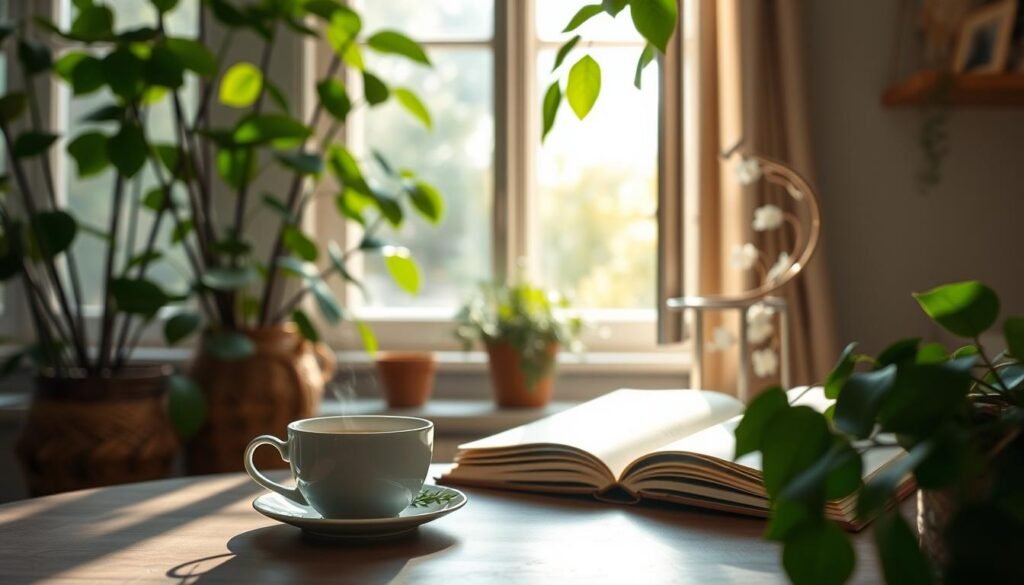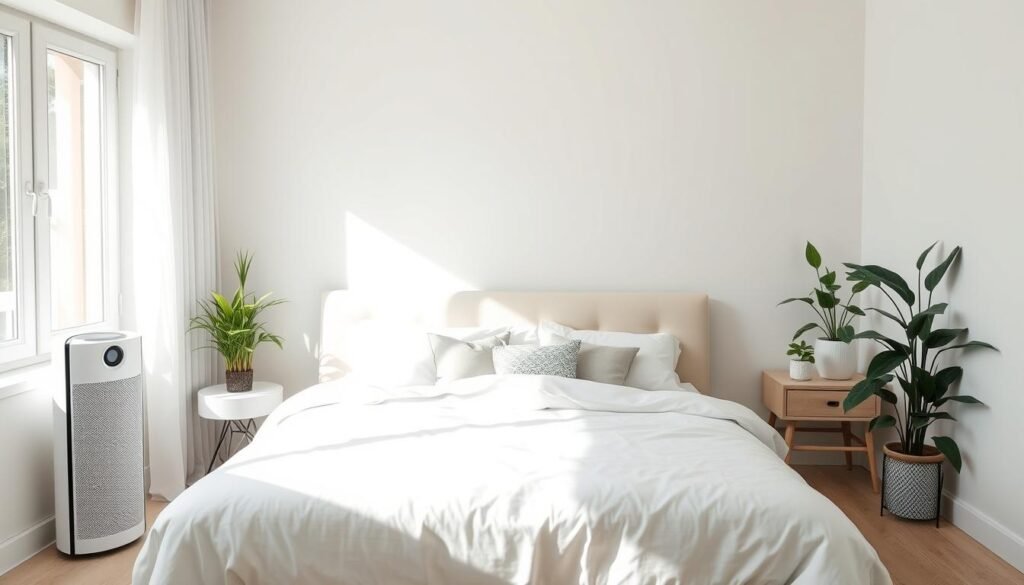Did you know nearly 30% of people get seasonal allergies? These allergies can bring on tough symptoms. They include stuffy noses, headaches, and especially tiredness. For anyone affected, it’s vital to understand why seasonal allergies make you so tired. This guide will dive into seasonal allergy fatigue. We’ll see how our immune system’s fight against things like pollen can really impact our lives.
When we face seasonal allergies, our bodies fight back. They release histamines, which can cause swelling in different places like the eyes and throat. This can mess with how well we sleep, leaving us drained. It can make everything harder, from work to being with friends. Seeing how allergies and tiredness are linked is step one to handling them.
Understanding what causes your allergies can help you feel better. This article will help you learn more about it. We’re talking about ways to fight off the fatigue that allergies bring. By reading, you can improve your daily life a whole lot.
Key Takeaways
- Nearly 30% of individuals experience seasonal allergies, leading to fatigue.
- The immune response to allergens triggers inflammation that affects sleep quality.
- Common allergens such as pollen and pet dander can exacerbate fatigue.
- Identifying allergens is key for effective management of allergy symptoms.
- Improving sleep hygiene is crucial for those suffering from allergy fatigue.
Understanding Seasonal Allergies
Seasonal allergies occur when your body’s immune response reacts to allergens like pollen. This usually happens in spring, summer, and fall. Allergy triggers often include pollen from trees, grasses, and weeds. People with allergies may sneeze, have itchy eyes, and feel tired.
Knowing how allergens affect you is key to managing symptoms. These allergies can mess with your sleep, leaving you tired the next day. When your body fights allergens, it releases histamines. This can ruin your sleep quality.
Outside allergens like pollen and mold can make you feel wiped out. Inside, things like dust mites, pet dander, and mold do the same. Dealing with these allergens can make you feel tired, stressed, and anxious.
There are ways to fight allergy fatigue. Good strategies include avoiding allergens, taking medication, and keeping your space clean. Talking to professionals can help you find the best plan. For more on natural treatments, visit this link.
What Is Allergy Fatigue?
Allergy fatigue is a common but often ignored aspect of seasonal allergies. It makes you feel constantly tired, even after you’ve slept well. This can really affect your day-to-day life and happiness.
It’s important to know the signs of this kind of fatigue. Getting ahead of it can help manage its effects on your health.
Symptoms of Allergy Fatigue
Those with allergy fatigue face many tough symptoms. Here are a few:
- Persistent tiredness that lasts all day.
- Reduced concentration, making focusing hard.
- Brain fog, leading to confusion and forgetting things.
- Low motivation, which makes doing daily tasks hard.
- Runny or stuffy nose, adding to the discomfort.
How Fatigue Feels
Fatigue from allergies feels like carrying a heavy weight. It makes doing anything, physically or mentally, really tough. This constant tiredness often comes from other allergy symptoms too, like a blocked nose. That ruins your sleep and makes you even more tired.
| Symptom | Description | Impact on Daily Life |
|---|---|---|
| Persistent Tiredness | A constant feeling of being worn out | Struggling to get through daily tasks |
| Brain Fog | Feeling confused and forgetting things | Problems at work and with friends |
| Low Motivation | Not feeling up to doing much | Missing out on fun and seeing people |
| Nasal Congestion | Stuffy nose making it hard to breathe | Sleep issues and extra discomfort |
The Science Behind Allergy Fatigue
Allergies tire us because our body fights allergens hard. When we encounter allergens, our body releases histamines. This histamine response warns our immune system. But, it makes us sneeze, cough, and feel tired. These symptoms affect how we function every day.
Histamine Response
Histamines are important for fighting allergens. They cause inflammation to protect us. This can make us feel tired because our body is busy fighting. Over half of people with allergic rhinitis feel tired because of this. The effect of allergy symptoms on energy is huge, leading to exhaustion.
Impact on Sleep-Wake Cycle
Allergy symptoms also mess with our sleep. Inflammation and a stuffy nose make it hard to get good sleep. This lack of sleep makes us feel more tired. The problem with allergies is they hurt our sleep quality. Understanding how allergies, sleep, and tiredness are connected can help those looking for relief.
| Factors Influencing Allergy Fatigue | Description |
|---|---|
| Histamine Release | Triggers inflammation, leading to tiredness. |
| Sleep Disruption | Nasal congestion and symptoms interfere with quality sleep. |
| Energy Diversion | Body redirects energy to manage immune response, causing fatigue. |
Common Allergens That Cause Fatigue
Finding out common allergens is key to handle allergy-caused tiredness. Many allergens play a part in making you feel drained, touching on your daily activities and health. If you have allergies, knowing what triggers them is crucial.
Pollen Allergies
Pollen allergies are common in people with seasonal allergies. Grass, trees, and ragweed release pollen that can cause this. When these plants bloom, they can make you feel more tired, especially your mind, as symptoms get worse.
Indoor Allergens
Things inside your house can also make you tired. Dust mites, pet fur, and mold are major indoor allergens. They cause ongoing allergic reactions, messing up how well you sleep and making you more tired during the day.
Food Allergies
Eating certain foods can make some people tired too, especially if they’re allergic to dairy or gluten. These allergies can upset your stomach and cause swelling. This ups your chances of feeling sluggish and worn-out.
| Type of Allergen | Common Sources | Impact on Fatigue |
|---|---|---|
| Pollen Allergies | Grass, Trees, Ragweed | Increased mental fatigue during high pollen seasons |
| Indoor Allergens | Dust Mites, Pet Dander, Mold | Interferes with sleep quality, exacerbating tiredness |
| Food Allergies | Dairy, Gluten | Leads to gastrointestinal distress and inflammation-related fatigue |
Why Do Seasonal Allergies Cause Fatigue?
Why do we feel tired when we have seasonal allergies? It’s because our bodies work hard during allergy seasons. The immune system fights off allergens, which takes a lot of energy. This leads to what we call seasonal allergy fatigue.
Immune System Response
When things like pollen get into our bodies, our immune system makes antibodies to fight them. This battle releases chemicals, including histamine, and causes inflammation. Sneezing, coughing, and a stuffy nose are common. These reactions use up a lot of energy, making us feel tired, especially in the afternoon.
Inflammation and Energy Drain
Long-term inflammation from allergies can really affect our energy. It can mess with our sleep and make us feel foggy-brained. This lack of good sleep results in feeling tired all day. Since many people deal with these symptoms, finding ways to reduce inflammation is key to feeling better.
| Condition | Fatigue Impact | Treatment Approaches |
|---|---|---|
| Allergic Rhinitis | Causes significant tiredness, especially during peak seasons. | Antihistamines, corticosteroids, allergy shots. |
| Chronic Sinusitis | Can lead to brain fog and disrupt sleep. | Decongestants, saline rinses, nasal steroids. |
| Food Allergies | May contribute to fatigue in sensitive individuals. | Dietary adjustments, avoidance of allergens. |
| Dust Mite Allergies | Can worsen tiredness and allergic symptoms at home. | Regular cleaning, hypoallergenic bedding. |
Effects of Sinus Congestion on Energy Levels
Sinus congestion is common with seasonal allergies and greatly affects energy. It makes breathing hard, especially during sleep. This often disturbs sleep, a problem many with allergies face.
Connection to Sleep Disruption
Struggling to sleep or stay asleep is common with sinus congestion. This leads to poor rest. Many don’t realize that their tiredness is due to allergies. Knowing this can help manage symptoms better.
Brain Fog and Concentration Issues
Sinus congestion also causes brain fog and focus problems. This issue is worse with disrupted sleep. It makes work or home tasks hard, increasing allergy fatigue.

Antihistamine Side Effects and Fatigue
Finding relief from allergies often comes with side effects, like feeling sleepy. This is due to antihistamine side effects. People trying to handle their allergies face a choice between different types of antihistamines. It’s important to know about these to make good choices, particularly if you want to stay awake and alert.
Types of Antihistamines
There are two main groups of antihistamines: first-generation and second-generation. First-generation antihistamines, for example, diphenhydramine (Benadryl®), often make you feel very tired. Right now, there are no non-sleepy versions of Benadryl® available.
On the other hand, second-generation antihistamines like cetirizine (Zyrtec®), fexofenadine (Allegra®), and loratadine (Claritin®) claim to make you less sleepy. Among these, Allegra is usually seen as the one that makes you least sleepy. Plus, using nasal spray antihistamines might help since they work directly in your nose and tend to not make you as sleepy.
How to Choose Non-Drowsy Options
To steer clear of sleepiness from antihistamines, it’s smart to pick second-generation types called “non-drowsy options.” Taking them at night might also reduce sleepiness during the day. Keep an eye on how these meds impact your health overall. This ensures they help your symptoms without making you too tired. Talking with doctors is wise to customize an allergy strategy that fits you well, including fighting off fatigue. For more info, visit healthdirect.
Combatting Allergy Fatigue
Seasonal allergies can really affect your life, especially during spring, summer, and fall. One surprising symptom is fatigue. This can make you feel slow, foggy, and very tired. Figuring out your specific allergens is key. It helps you avoid things that make your symptoms worse.
Identifying Allergens
It’s important to know what causes your allergies. Things like pollen, mold, dust, and pet dander can drain your energy. Allergy tests can tell you what you’re sensitive to. This lets you avoid those allergens. Keeping these allergens out of your space can make you feel less tired and healthier.
Effective Medications
Medicines are vital for managing allergy symptoms. Antihistamines and nasal sprays help a lot of people. However, not all medicines work the same for everyone. It’s good to talk with a doctor about your choices. For some, allergy shots or sublingual drops are best. These treatments increase tolerance to allergens and improve life quality.
Home Remedies
There are home remedies that can ease allergy symptoms and fatigue, too. Using a Neti pot or steam inhalation can help clear your nose. A clean place to sleep is also crucial. Wash your bedding often and keep your room tidy. This can make a big difference in your sleep quality and reduce allergy fatigue.

Lifestyle Changes for Better Allergy Management
Making lifestyle changes can greatly help control allergies and lessen tiredness. There are many steps people can take to feel better overall.
Diet and Nutrition
Eating a diet filled with anti-inflammatory foods is key to fighting off allergy symptoms. Enjoying a variety of fruits, veggies, and foods rich in omega-3 fatty acids strengthens the immune system. Also, drinking plenty of water is crucial for symptom management and staying energetic.
Regular Exercise
Regular physical activity improves both your body and mind. Whether it’s walking, biking, or practicing yoga, it can help you sleep better, which combats allergy-related exhaustion. Moving regularly enhances oxygen flow, easing congestion and boosting your energy levels.
Stress Management Techniques
Using stress management methods can better your immune system’s response to allergens. Techniques like meditation, yoga, and deep breathing reduce stress which may lower allergy symptom severity. Incorporating these practices into your daily life can improve your well-being and resistance to allergy fatigue.
Improving Sleep Hygiene for Allergy Sufferers
Good sleep is key for people with seasonal allergies. Symptoms like stuffed noses and snoring from hay fever can harm sleep. Focusing on better sleep habits can improve how well they sleep and their overall health.
Creating Allergen-Free Sleep Environments
To sleep better, setting up an allergen-free space is important. Here are ways to cut down on allergens:
- Use allergen-resistant bedding to help minimize dust mites and pet dander.
- Wash bed linens in hot water to get rid of pollen and other allergens.
- Install a HEPA air purifier in the bedroom to filter out mold and pollen.
Making these changes can help people sleep more comfortably and be healthier. For more info on managing allergies and sleep, check out sleep foundations online.
Establishing a Relaxing Bedtime Routine
Having a calm bedtime routine is crucial. Doing relaxing activities before bed can help people relax. To relax before bed, try:
- Reading in soft light to avoid eye strain.
- Doing gentle stretches or mindfulness to relax.
- Staying away from screens an hour before bed to reduce blue light exposure.

These steps help create a calm sleep environment. By following these tips, people can sleep better and feel less tired from allergies.
Seeking Professional Help for Allergies
For many, persistent allergy symptoms and fatigue are a big problem. This is where professional help comes in handy. An allergist gives personalized advice based on your unique needs. They suggest allergy testing to find out what triggers your symptoms.
Consulting with an Allergist
Talking to an allergist can really improve how you handle your allergies. They understand how allergens affect your immune system. With their help, you can get a treatment plan just for you. This can help you feel better and enjoy life more.
Allergy Testing and Treatment Plans
Allergy tests are key if you want to feel better. They involve tests on your skin or blood to find what bugs you. Then, the allergist makes a plan for you to tackle your allergies.
- Over-the-counter meds like antihistamines and nasal sprays can help.
- Sometimes, prescription drugs are needed.
- Immunotherapy might be suggested for long-term relief by slowly getting your body used to allergens.
With an allergist’s help, you can better manage your allergies. This can lead to less tiredness and a better life.
| Allergy Type | Common Symptoms | Treatment Options |
|---|---|---|
| Pollen | Sneezing, congestion, itchy and watery eyes | Antihistamines, nasal sprays |
| Pet Dander | Coughing, itching, fatigue | Environmental controls, allergy shots |
| Dust Mites | Itchy eyes, runny nose, sleep disturbances | Regular cleaning, anti-allergen bedding |
| Mold | Headaches, fatigue, respiratory issues | Dehumidifiers, avoiding damp areas |
Conclusion
Knowing how seasonal allergies affect fatigue helps people manage their symptoms better. When pollen, mold, and dust mites are around, they can hurt your energy. These allergens may disturb your sleep, making you tired all day.
To fight allergies, make your sleeping area free of allergens. Use bedding that keeps allergens out and keep humidity levels just right. Regular cleaning of pets and considering allergy shots can greatly improve life for those with allergies. These steps can change how you deal with allergy tiredness, leading to a healthier life.
It’s key to learn about allergy triggers and their effects. With time and effort, you can overcome tiredness caused by allergies. This lets you live a more energetic and allergy-free life.